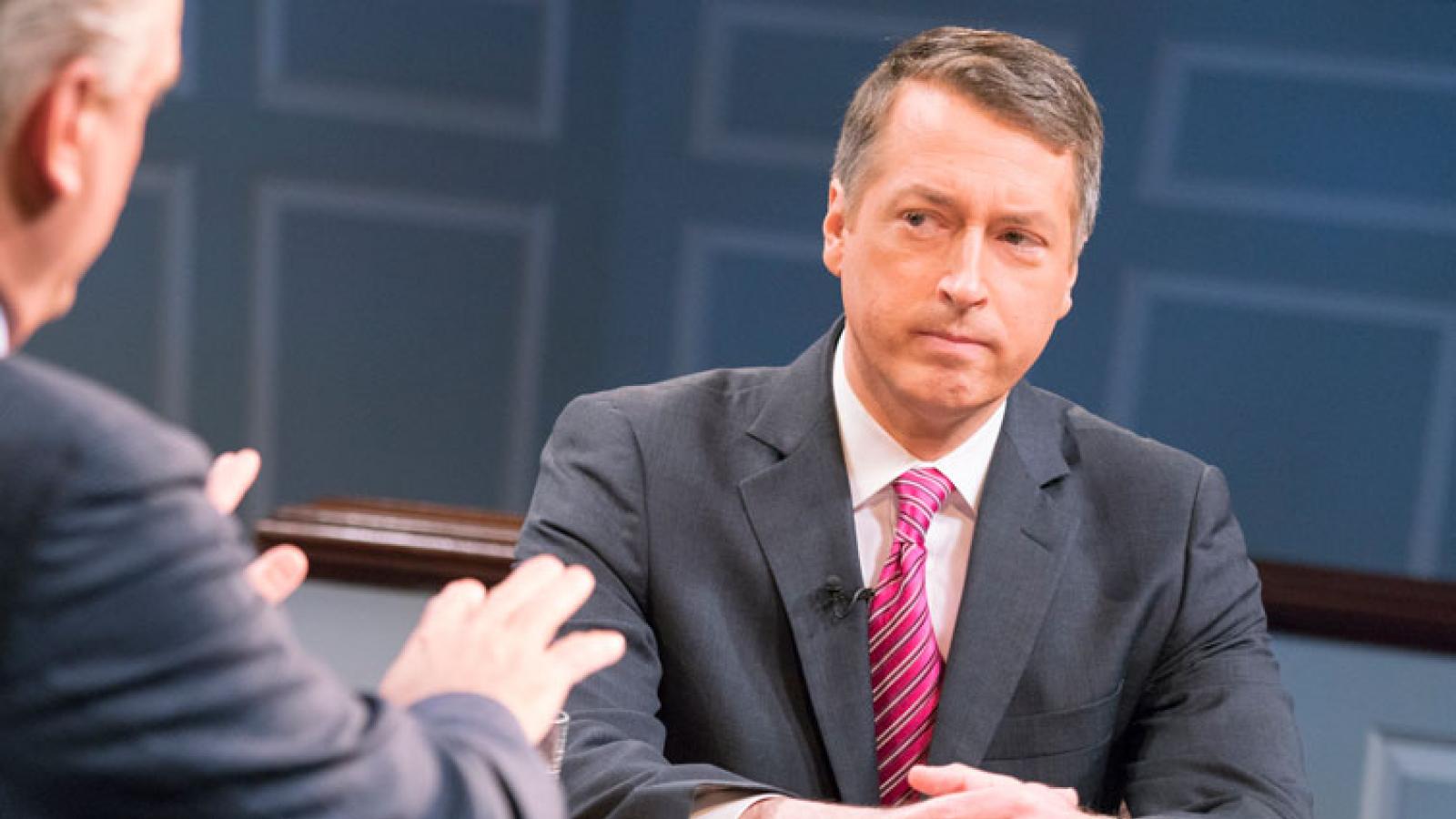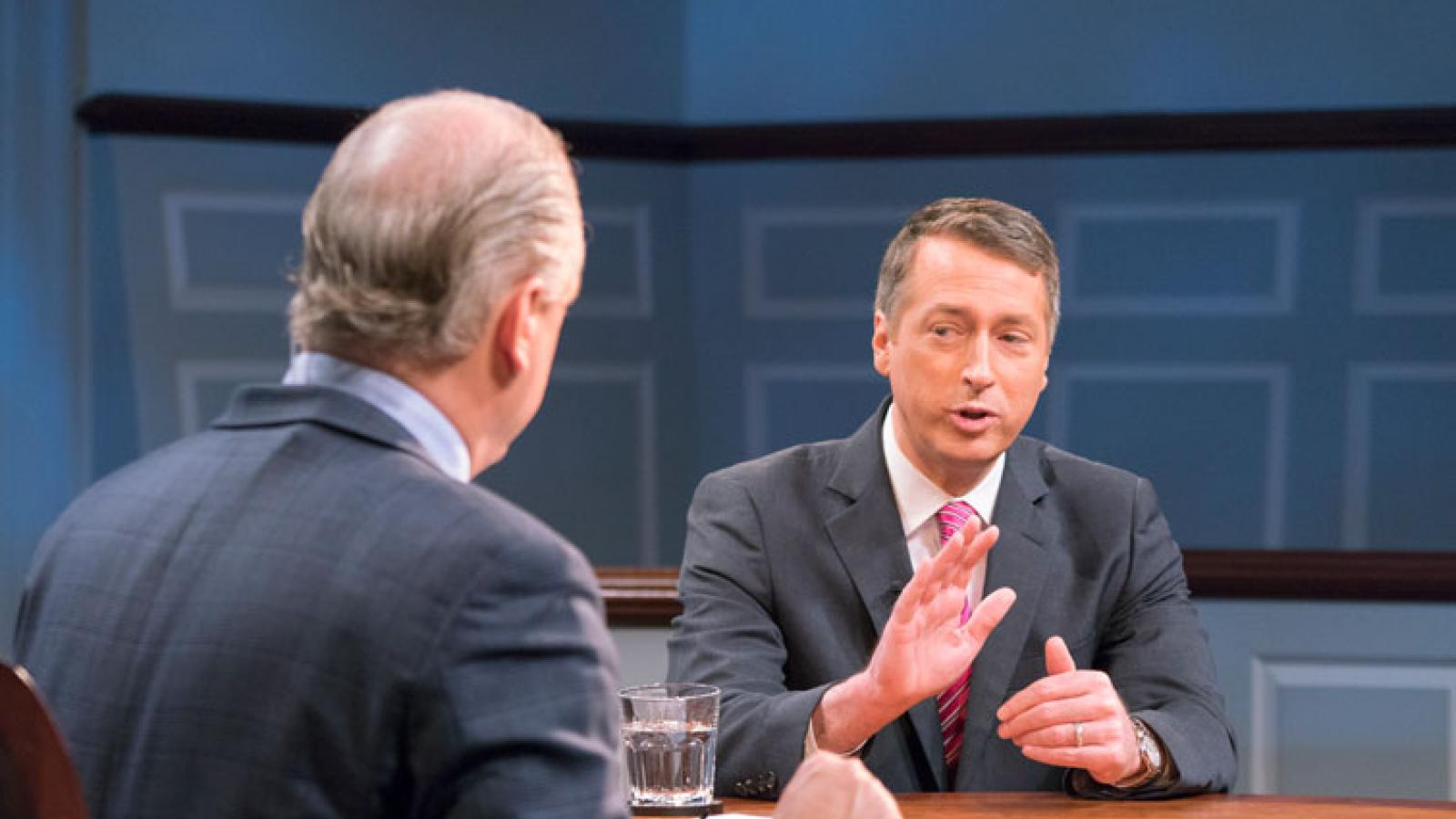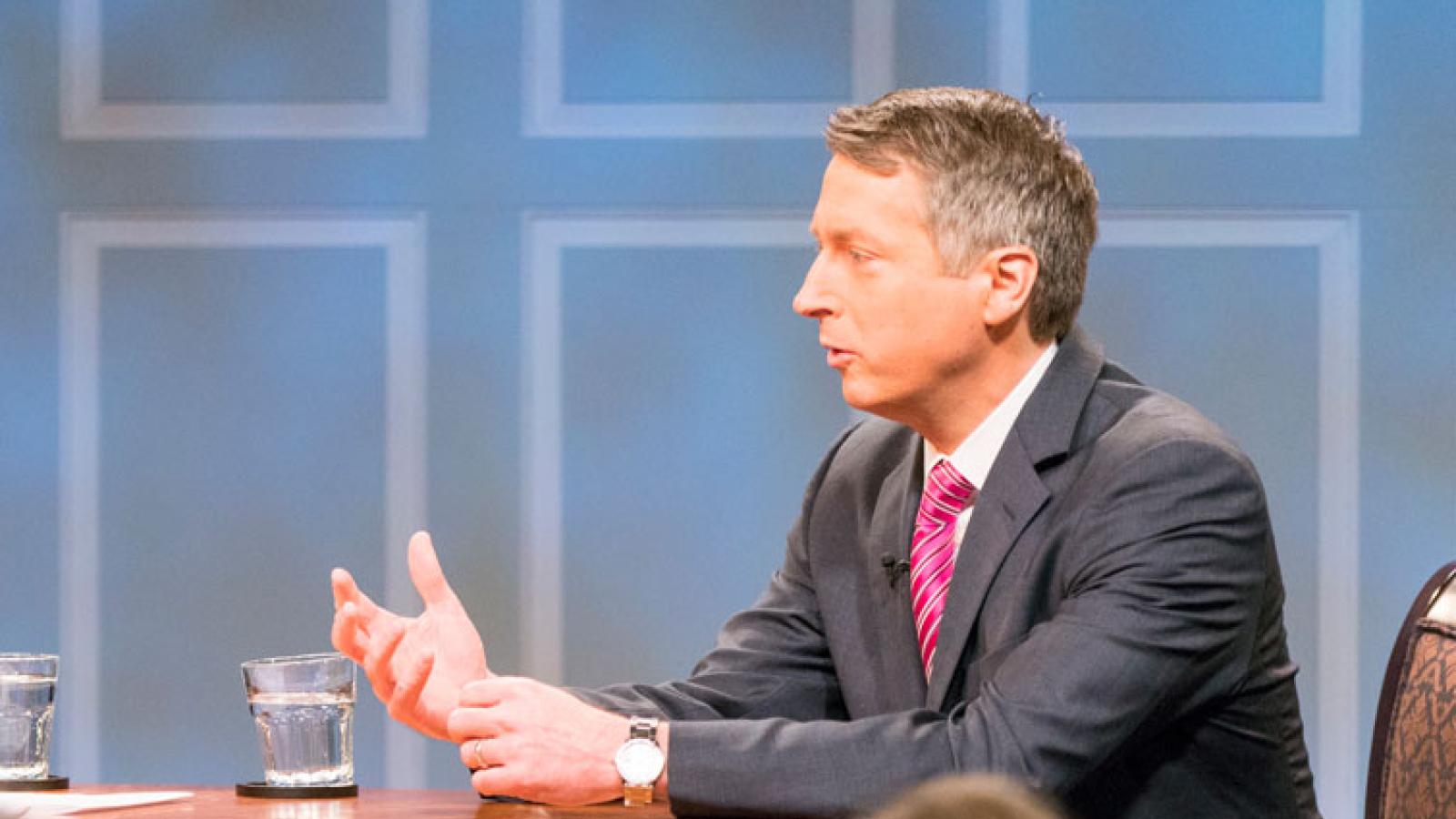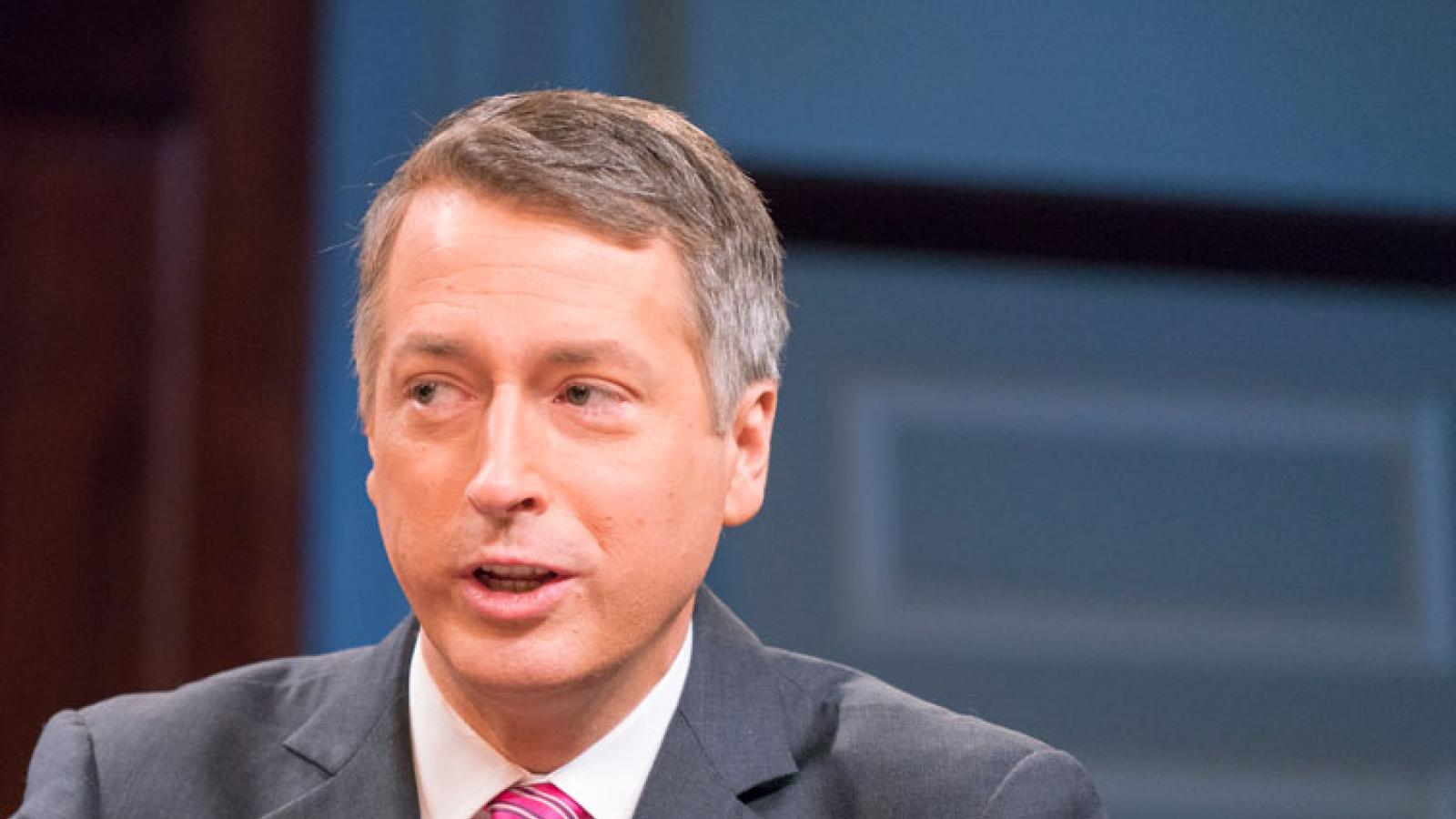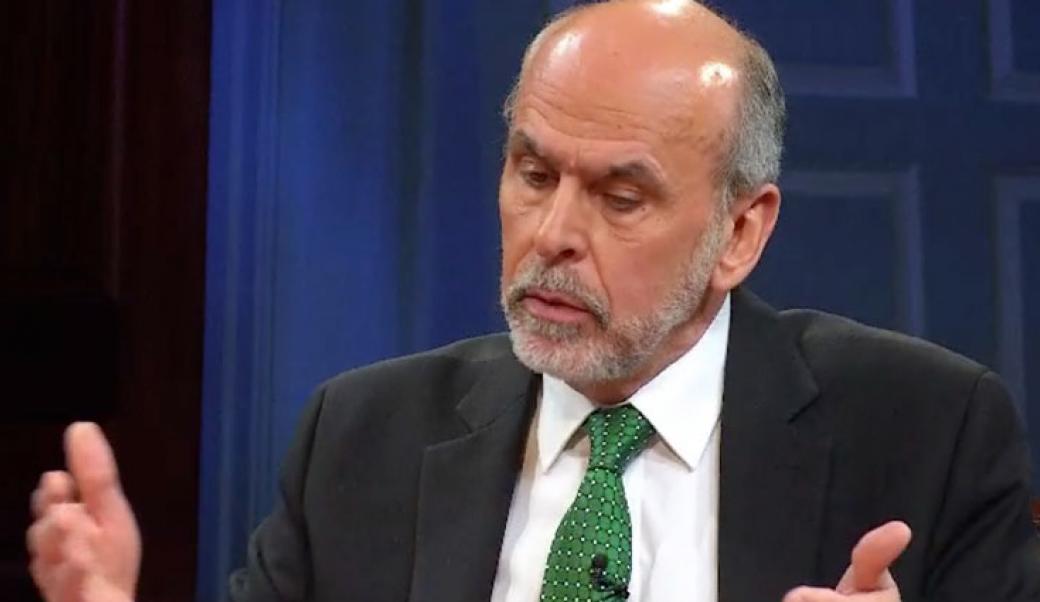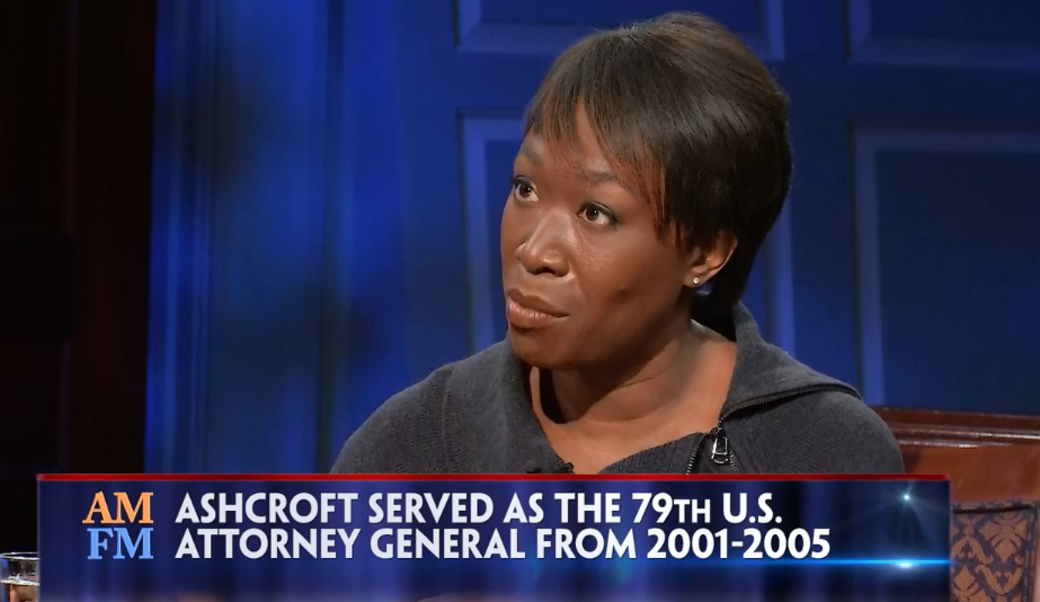About this episode
June 04, 2017
Rich Lowry
Rich Lowry, the editor of National Review, as well as a syndicated columnist and a commentator for the Fox News Channel, discusses the phenomenon of "fake news," and how the conservative establishment views President Trump. Lowry is the author of Lincoln Unbound and the New York Times best seller Legacy: Paying the Price for the Clinton Years. Lowry began his career as a research assistant for Charles Krauthammer and was selected by William F. Buckley to lead National Review in 1997.
Media and the Press
What is real news?
Transcript
Douglas Blackmon (set over shoulder): What does it feel like to be on the receiving end of a flaming Tweet from Donald Trump? This week on American Forum, a conversation with the editor of National Review, one of the most influential conservative magazines in America.
OPENING TITLES AND MUSIC
Douglas Blackmon: Welcome back to American Forum. I’m Doug Blackmon. Our guest this week was only 24 years old when he tied for second place in an essay contest sponsored by the legendary conservative magazine, National Review. The magazine was so impressed that the editors plucked him out of his job at a local newspaper in northern Virginia and gave him an internship. Five years later, not yet 30 years old, he took over as editor; a position once held by the magazine’s famous founder and icon of American intellectualism, William F. Buckley, Jr. Now, almost 20 years later, Rich Lowry remains at the helm of a publication that some say is at a dramatic crossroads. Early last year, National Review published an entire issue under one big bold title: “Against Trump.” Not surprisingly, that ruffled some feathers among Republicans and conservatives, including a decidedly unfriendly fight on Twitter with Fox News personality Sean Hannity. Despite the criticism, Lowry hasn't backed away from challenging the candidate and now new president, whenever he thought Donald Trump was wrong on specific issues. As you might imagine, that led to some heartburn at Trump Tower and the White House. Lowry was on the receiving end of a brutal television and Twitter barrage from Mr. Trump, after a Republican primary debate. Commenting on that event, Lowry said Carly Fiorina, another GOP contender, had taken a knife to Mr. Trump and, well, I don’t think we can repeat it here on public television. The future president responded by saying our guest was “out of control” and that perhaps the most famous conservative publication in America was “failing” and had “lost its way.” The exchange didn’t stop there. So what does the Trump presidency mean for serious, conservative media? Is it just as vulnerable to the charge of “fake news,” as the president talks about so often. Is the National Review, of all publications, also “lamestream media,” or possibly an “enemy of the people?” What’s the future of National Review, now over 60 years old? Rich Lowry, thanks for joining us.
Rich Lowry: Thanks so much for having me.
Blackmon: So how are you and the president getting along now?
Lowry: I don’t hear a lot from the president, frankly, but I’m sure he thinks I’m still out of control.
3:06 Blackmon: You don’t look out of control. Let’s try to sort out a little bit, quickly, with a few short questions, what the boundaries of your differences might be, at least on the most obvious things. Let’s just talk through a few quick things. Agree or disagree, and a quick thought on, but the president’s recent missile strike in Syria?
FACTOID: 20% of Syrian government aircraft destroyed in April missile attack
Lowry: We opposed it, not harshly, but we think if you’re going to engage in a military intervention in a country, it’s good to have the strategy first, and then engage in the military action.
3:37 Blackmon: Where’s National Review on the congressional investigations into the allegations of Russian meddling in the 2016 election?
Lowry: We’re interested in the facts, and that’s just, that’s not just a talking point. We sincerely want to know what the ground truth is, both about the Russian meddling in the election and any possible coordination with the Trump team, and also about the campaign of leaks we’ve seen against various Trump administration figures. My guess is that both these stories, there will be less fire than either side wants to believe. So I doubt there’s going to be a smoking gun there.
4:16 Blackmon: All right, we’ll come back to that. Agree or disagree with the president’s immigration executive order. I won’t call it ban on Muslims, but whatever you want to call it, agree or disagree?
FACTOID: Executive order banned migrants from six countries for 90 days
Lowry: Generally agree. I think the least important part of the travel ban is the actual ban, but I do think the idea we need stricter vetting, that we need to reevaluate our refugee program, that we should cap it at about 50,000 a year, which is kind of close to the historical average. I think that all makes sense and just in general all along, even when we’ve been most critical of Trump, the issue where we found most common ground with him is on immigration, where I think he’s challenged a lazy establishment consensus on both the left and the right.
5:01 Blackmon: All right, so my next one was building the wall between the U.S. and Mexico.
Lowry: Not necessary. We need more, some more structure on the border in certain places, but the real key is interior enforcement. What we need is a mandatory e-verify system that cuts off the jobs magnet, which is the real reason illegal immigrants come here. The Trump folks tend to focus on illegal immigrant crime. At any time you have an illegal immigrant committing a crime, it’s particularly bothersome, because these are people who shouldn’t have been here in the first place, but the lion’s share, the vast majority of illegal immigrants come here to work and they do work, and they’ll keep coming unless you turn off the jobs magnet.
FACTOID: E-Verify used at 1.9 million work sites by 600,000 employees
5:45 Blackmon: So it sounds like, working through those, that there are—that the positions that you guys advocate, particularly in terms of policy, are ones that President Trump, as his most thoughtful moments, would probably—he wouldn’t really have a problem with your positions, and the biggest problems you have with him more tend to be with mechanics and approach.
Lowry: Character. [Blackmon: Character.] Character is a huge issue, it’s been a huge issue all along. I’ve always been much more favorable to Trump-ism, than to Trump himself. And he has, you know, especially one issue we haven’t talked about was the Gorsuch nomination, which is an absolute home run, the thing we’ve been most pleased by, and that’s not—he didn’t nominate Judge Gorsuch because Donald Trump is a constitutionalist deep in the marrow of his bones and wants a justice who is going to check executive power and the administrative state.
FACTOID: Gorsuch joined court after Senate refused vote on Merrick Garland
No, he did this because it was necessary to keep part of the coalition onboard, which is social conservatives and traditional conservatives. He came up with a list, he said I’m going to choose from this list, and he hued to that promise. So that was a sign, in a way, that some of us at National Review doubted, that you can do transactional politics with Donald Trump, and that is very promising.
7:08 Blackmon: You wrote recently, and this is pulled out of something else and so I want you to give me a little context to it, but this is back to the topic of Russia and the concerns about Russia. You wrote, “It’s impossible to conclude anything other than that Obama was a Russian stooge, and not out of any nefarious dealings, but his own naivete and weakness.” What exactly did you mean by that, what were you talking about?
Lowry: Well, one thing we’ve learned, and we should have already known this, but it’s been really starkly evident the last year or half, or so, partisan hypocrisy is the strongest force in the universe. So, the Russians meddled in our election and you had a presidential candidate saying that’s not a big deal, I don’t think it was really them, it might have been some fat guy sitting in his bed. And you had a lot of folks on the right saying oh that’s great, we’re fine with that. And ah, now you have a lot of people on the left basically sounding as if they are the toughest and most vicious cold warriors this country has ever seen. And the fact is if you look at Obama’s policy, when he was elected, Georgia had just recently, months earlier, invaded a sovereign country. That’s really all you needed to know. If you need any more information about the Putin regime, that should have been it. Instead, we reset, we’re going to be nice to you, we’re going to pull these long-range missile defense systems out of two European countries because you don’t like them. And you know, he whispers to Medvedev, in a hot mic moment, “Don’t worry, I’ll be more flexible after the campaign, in 2012.” And he finally clues in, I think, to the nature of the regime, and we’re going to get nothing from the Russians. They invade Ukraine, we don’t give the Ukrainians weapons to defend themselves. They intervene in Syria, basically with President Obama’s okay or tolerance, because he needed a fig leaf to get out of the redline fiasco in Syria, and Russia provided one, because they said they negotiated this deal where the chemical weapons were coming out. So even when his naivete had been—had seen this come up, and President Obama is incredibly weak and passive towards Russia. That is the policy that the worst case scenario, President Trump would have followed. And liberals, if you were doing anything like that right now, liberals would be completely outraged, and some conservatives would be fine with it. I think if there’s one thing we’ve been consistent about at National Review, we have always, throughout our history, opposed any effort to get along with Russia, because we think it’s a fool’s errand. Certainly, this regime is hostile to our values and our interests, and we see that every day.
9:46 Blackmon: Let me ask you about something else, uh that uh, but well first though, you mentioned a minute ago, the character of the president, that being such a central issue. So if Jeb Bush, if we went on back and we had the candidate espousing essentially all of the same positions as Donald Trump, were Jeb Bush, would you have been okay with that candidate?
Lowry: That’s a great question. We’d be much more okay with that candidate, but Trump, during the campaign, he was talking about NATO being obsolete. He was really suggesting he was going to tear up the international trading order. So there are a number of things policy-wise, that were also fundamental disagreements, but we would not have had the same discomfort with the idea of Jeb Bush even espousing those views being president of the United States, that we did with Trump. And now, look, maybe what we’re seeing, and it remains to be seen, but that he’s going to be somewhat constrained in the office. He’s still tweeting outlandish things, he’s creating controversies that are extremely distracting to the country and his own administration, you know the allegation that he was wiretapped by Barack Obama.
FACTOID: Trump ranks 34th biggest, with over 30 million Twitter followers
But it may be that over time, just the pressures of the office and the institutional constraints of the office, make these character issues not as grave a problem as we might have feared, but that remains to be seen. Usually, the pressures of this office are such that any personality flaws are magnified, rather than minimized.
11:26 Blackmon: Yeah, we’ve certainly seen that in past presidencies. In that now famous/infamous 2016 issue, the “against Trump” issue, where you’ve dedicated the entire magazine to why President Trump should not become president, I think this was your writing in that particular edition, and you said that the concern, the baseline concern of his election, would be that, “The movement that ground down the Soviet Union and took the shine off of socialism would have fallen in behind a huxter. The movement, concerned with such permanent things as constitutional government, marriage, and the right to life, would become a clack for a Twitter feed.” You know, this trivialization of what have been the most sacrosanct ideals of the conservative movement. He’s been elected now. Do you think this happened?
Lowry: Well, I think there are warning signs but basically, our evolution, we were strongly opposed to him in the primaries, we really wanted anyone else. We couldn’t get onboard in the general election; we were much harsher about Hillary Clinton. I’m not sure anything kind has ever been written about Hillary Clinton, in our pages ever. But now he’s president of the United States, so you don’t have other options for another president and you just have to hope that he does the best he can. So far, some of those issues that would have been most concerning to us, have failed to materialize. The protectionism, this might be the thing I’m most surprised by from the Trump administration so far. It’s not clear it’s a protectionist administration. If there’s one issue he’s been completely consistent on for 40 years, is that we’re getting ripped off by bad trade deals and we’re suckers, and all these things need to be ripped up and negotiated by the one person on the planet who is competent enough to negotiate them, Donald Trump. So far that’s not happening and we’re getting reports of intense debates within the administration about how aggressive they should be on trade. That is something where, in the primaries, we would have—you know, is a flashing red light, and now it’s something of a yellow light. Can I flip the conversation around a little bit [Blackmon: Sure.] and talk about the aspects of Trump that I found most appealing and promising? Which I do think the Republican Party had become out of touch, it had become much too beholden to certain verities, going back to the 1980s. It desperately needed to be updated and had become overinvested in the entrepreneurial idea. You saw this in the notorious Mitt Romney “47 percent” remark, just a contemptuous attitude toward half the country that doesn’t happen to make enough money in order to pay income taxes.
FACTOID: Leaked video of Romney’s 2012 remark hurt his presidential bid
Trump has blown a lot of that out of the water and I do think the party needed to become more populist. I do think the party needed to become the party of workers and Trump, through shear force of personality in part, has made that vista possible. But this is my other concern with the administration, is we’re seeing kind of populisms false start here, because there’s no populist think tank, there is no government in exile of populous, just waiting to ride the wave of the Trump administration and come back into office the way all the former Bush people were, there are no off-the-shelf policy proposals and there’s no populist wing in Congress. So you basically have Trump himself and a small, relatively small circle of aides even within the White House, the populous are just a fraction of the White House staff.
15:12 Blackmon: But so what do you do? Trying to be the sober voice in the midst of all this, how do you—since you think that’s a good idea, to adapt in some fashion, to his populism, how does the party do that?
Lowry: Well, one, and most importantly, is just keeping—focusing on the interest of working class voters and moving beyond an economic policy that is just monomaniacally focused on marginal income tax cuts.
FACTOID: Trump wants corporate federal tax rate dropped from 35% to 15%
So let’s think about maybe cutting payroll taxes, you know those are taxes that that 47 percent that doesn’t pay income taxes, and no matter how much you cut income taxes or how you structure it, you’re not going to cut taxes for those folks. Maybe you should cut their taxes but cutting a tax on labor. If you’re going to be the party of workers, you should be the party encouraging and not disincentivizing labor.
FACTOID: Trump plan reduces tax brackets and caps itemized deductions
Um. so I think that again, if the party is going to be more populist, the conversion should happen, sort of the intellectual aperture and the policy aperture should open, but so far it hasn’t.
16:21 Blackmon: It’s become something of an article of faith among a whole lot of people, including some Republicans, that the one thing that definitely is bad in the White House is Steve Bannon. You have taken a position, National Review has written about that actually the real risk is what has begun to happen. Jared Kushner, the husband of the president’s daughter, Ivanka, their rise in the White House, that other people look at that and say okay, those are leavening influences on the president, those are more normal, rational people, and that crazy right-winger, ultra right-winger, Bannon, declining, that’s a good thing. But you guys are seeing it the opposite, right?
Lowry: Yeah. My fear, one of my fears, I’ve talked a lot about my various fears, I’m a fearful guy, was that the first year would go badly for Trump and he would pull a mini Schwarzenegger, which is Arnold Schwarzenegger is elected in a great populist revolt in California, came in as a reformer, a conservative reformer, and just broke his sword against the nurses’ union of all things, don’t pick a fight with nurses unions.
FACTOID: Schwarzenegger elected California governor in 2003 with 49% of vote [Blackmon: Or teachers’ unions.] Yes. And basically switched sides. I think there’s still a danger of this happening with Trump. Now I don’t think he could do a full Schwarzenegger, but he could certainly change the iteration of his presidency and attempt to go in a more moderate and centrist direction. I think we’re seeing signs of this, certainly the internal power struggles point in this direction where at the beginning you had three centers of power, you know Reince Priebus, the establishment Republican, Steve Bannon, the outside populist, and Jared Kushner, the son in-law. It was always obvious, among those three, the one who wasn’t going to be fired, was unfireable, is Jared Kushner. Maybe not technically unfireable, I think Mussolini shot his son in-law, so I guess you can fire a son in-law, but highly unlikely. Kushner has allies, including very importantly Gary Cohn, an economic advisor, kind of came out of nowhere, a Goldman Sachs guy, a New York Democrat. These are advisors who I believe have zero taste for Trump’s populism, especially on issues like immigration, so it’s still, if this year continues to slide the way it’s been going, they could really have the whip hand within the White House in several months.
18:47 Blackmon: Part of what’s interesting to me about this is that the appeal of conservatism over time, and particularly in the era of William F. Buckley, your predecessor, founder of your publication, but one of the remarkable things was, one of the great appeals was a kind of purity, that kind of fierce purity, such as when Buckley denounces the John Birch Society and that branch of right-wing thinking, and the world of thinkers immediately around Buckley are able to essentially clean up conservative thinking and separate it from some of these primitive ideas that had once been tied up in it. Conservatives did that, the conservative movement that then led to Ronald Reagan did that, at at time when the Democrats still had a white supremacist wing and, you know, it had all sorts of terrible association with the worst dimensions of American society. And so when I look at the current environment, one could certainly say, even if Bannon has been overly maligned, you certainly can say that Breitbart in some fashion, and the “alt-right,” whatever exactly that is, well that looks a lot like the John Birch Society kind of people that your predecessor wisely pushed out of the movement. Is it time for something like that at this moment now? That’s one reason I’m a little surprised at National Review’s openness to Bannon, and maybe he deserves it, but it surprises me a little bit.
Lowry: I think you have to make distinctions. The alt-right, I think it’s appropriate to analogize it to the John Birch Society, these are race obsessives who are white supremacists.
FACTOID: Founder named JOHN Birch Society after World War II soldier and missionary
It’s a very loose collection of people but they’re all reliably kooks and I think they are marginalized, and I think they should remain marginalized. Breitbart, although it has played footsie with those folks and provided them a forum, is not an alt-right site, it’s not a frankly racist website, and neither is Steve Bannon an alt-right figure, although that quote he said about Breitbart being a platform for the alt-right is understandably hung around his neck.
FACTOID: Bannon took over Breitbart after death of founder, Andrew Breitbart
21:03 Blackmon: I mean in the midst of all this, we have a president who throws around terms like fake news and enemy of the people. He doesn’t say all media are enemy of the people, that’s an important caveat, he just says all of the major publications and the mainstream media are enemy of the people. But now, but also a publication like yours gets tarred in these sorts of ways. Does that suggest that the bias arguments are really not what this has been all about, that you’re trying to do your part legitimately, the New York Times is trying to do its part legitimately, and it’s the person who just can’t bear criticism of any kind, that’s the real thing that’s happening?
Lowry: No. I think the media is more biased than ever before. I mean, it really has declared itself openly against Trump, to coin a phrase. But if you’re—that’s fine if you’re an opinion journalist or you’re running an opinion magazine. It’s not okay if you’re the New York Times and I will say though, with Trump and the media, it’s a love-hate dynamic. He calls the New York Times fake and failing and losing. Does he get Maggie Haberman on the phone at least once a week?
FACTOID: Haberman worked for Politico and New York Daily News before New York Times
Yes. Because he reads the New York Times and he cares what the New York Times says about him, no matter how harsh he is about the Times. The press, they are hostile to Trump. At the same time, Donald Trump is the greatest thing that’s ever happened to them. Subscriptions are up, ratings are up, and that’s just because interest is so high.
FACTOID: New York Times readers doubled in 2016; Fox has 1.72 million daily viewers
22:28 Blackmon: In that uh, in the Twitter storm back and forth that you had with candidate Trump, that I mentioned in the opening, one of the last tweets, I think, from the president, now president, in that sequence, was he said, “The late, great William F. Buckley would be ashamed of what had happened to his prize, the dying National Review.” I don’t know if you responded to that on Twitter, but that’s a hard one, that’s a spear right into your chest. What’s your response to that?
Lowry: Shortly after that, he tweeted that, someone, God bless them, found a Bill Buckley piece, in of all places Cigar Aficionado, about Donald Trump in 2000, in one of these period episodes where he was thinking about running for president and just doing it for publicity, and didn’t pull the trigger, and he wrote that Trump was a narcissist and a demigod. So as soon as I saw that I was like thank God, you know that’s all I need. But look, obviously Buckley, I think would have had—I shouldn’t say obviously, but I believe Buckley would have had the same qualms we do about Donald Trump. I don’t say obviously, because he was a very idiosyncratic mind, so you could never entirely predict where he would be on things, but my kind of acid test or my barometer of where Bill Buckley would be on something is usually George Will, you know kind of similar milieu, similar sensibility, and of course he’s appalled by Trump.
23:53 Blackmon: I said in the introduction, that you were 24 years old and you tied for second in an essay contest and got an internship. Who actually won and what happened to them?
Lowry: I don’t know, I don’t know, but as people have pointed out to me, tied for second basically means you’re third. Actually, there’s a Virginia connection. I wrote about Doug Wilder in this piece that I sent to National Review, when he was—his governorship was expiring and he was thinking of running for president. So I started at National Review, it was the honor of a lifetime, because I was a Bill Buckley kid. I discovered Buckley through his program Firing Line on PBS. Through that, I discovered National Review. I would smuggle copies of National Review into my high school classrooms and read it in-between the textbooks, you know what Playboy was to most normal teenagers, National Review was to me. [Blackmon: Not me, not me, not me.] Buckley wrote a piece for Playboy once and people criticized him for it and said why are you writing for Hugh Hefner’s publication, and Bill said, “I’ve got to find some way to reach my teenage son, Christopher, so I have to write for Playboy.” I was just completely delighted, it’s all I ever wanted to do, is work for National Review, and then to be selected as the editor, by Bill Buckley, was an incredible privilege and honor, and completely terrifying.
25:08 Blackmon: Well, Rich Lowry, thanks for being here.
Lowry: Thanks so much, appreciate it.
Blackmon: We hope you will join us for future editions of American Forum, where our focus is always on the presidency, the leaders of our nation, and the most vexing questions facing our society. You can watch us on your local PBS affiliate, or to join our ongoing conversation, look for us on the Miller Center Facebook page, where hundreds of thousands of people watch. Visit our new revamped website at millercenter.org, or follow us on Twitter. My handle is @douglasblackmon. President Trump, the way to find Rich is still @RichLowry. See

